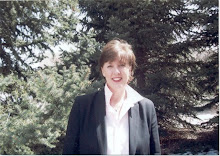One of the hallmarks of Western culture is its penchant for "individualism"--the conviction that by concentrating on developing the unique rights and talents of each individual, the outcome will be a healthy community. This idea is in contrast with "communal" societies, which believe that the way to a healthy individual is by promoting, first and foremost, the health of the collective group. [Whoa! Don't let your eyes glaze over just yet! Kinda complex, I know, but I won't get too technical.]
One thing sociologists and psychologists agree on is that our version of individualism is becoming pathological (disease-inducing), because taken to the extreme, individualism is leading many to intense feelings of isolation. Our penchant for individual uniqueness has mistakenly led us to believe we're each in this life alone. Consequently, we feel uncomfortable admitting our own limitations and reluctant to ask others for help and encouragement.
This type of pathological individualism fails to take two things into consideration: One is that, hands down, behind every successful individual is a host of people who has helped that person succeed. Successful people heartily acknowledge they freely depend on others to get them where they want to be.
Another is that, instinctively, humans are communal animals. By design, we are gregarious creatures and, not coincidentally, all of human culture is transmitted by teaching. What that means is that the tools necessary for humans to survive--and thrive--are taught to us by people around us. Without others passing on their knowledge, sharing their experiences and expertise, and offer themselves up as role models, human culture as we know it would come to a screeching halt.
More than that, scholars are coming to identify what makes human beings uniquely human: it's our ability to offer each other encouragement. As it turns out, no other primate has this ability. So, if that is true, doesn't that smack in the face of pathological individualism? I mean, shouldn't we all be giving and receiving an awful lot more encouragement?
I think this is all the more necessary for those of us who are attempting to forge a new and different path, who are opting out of the existing "SAD" way of life with hopes of creating a healthier way of life. With respect to the hygienic way of life, what I find so challenging is that there isn't an available social network in my immediate midst to encourage me onward, to lead by example, to inspire me and help me keep my canoe afloat. At this stage of the Natural Hygiene 'movement,' our social network is far-flung. There just isn't an established community of like-minded people right here that I can easily turn to. In fact, quite the opposite is true. At practically every moment, my social instincts are yanking me (and others, to be sure) back into the direction of unhealthful patterns of behavior.
All of us, hygienists and not, want very much to be held in high regard; we want to show our affiliation to the group. But without a tangible like-minded group, how do we satisfy these needs? Opportunities to "see" healthful living in action, and to glean healthful behaviors by some kind of osmosis, too, are few and far between.
Of course, this predicament isn't true only for natural hygienists, but for anyone who is trying to forge something different for themselves in the midst of seeming protests and resistance from loving family and friends. This, added to pathological individualism, makes for quite a challenge, to say the least!
So, what can we do? A solution came to me last night as I was falling off to sleep. We--each of us--have to play our 'encouragement' cards. We have to seek out opportunities to give and receive words of encouragement, so we all can feel much more secure, confident, and connected. It really doesn't matter if people are on the same path. That isn't a criterion. Only kind words of encouragement are. I'm not referring to that fluffy, candy-cotton junky kind of flattery that we're so used to hearing today. I'm talking about helping each other clarify our positive qualities and character traits: "Oh Debra, I really admire the discipline you bring to your karate practice." You can give that kind of approval without know a stitch about karate, can't you? You can solicit such encouragement from others, too...right?
Don't you see these abilities in yourself? When a friend or family member turns to you for advice or emotional support, doesn't your mind immediately go into overdrive thinking of ways you can help, even if you might not possibly understand fully what they're facing?
I consider this to be one of the essential steps to emotional poise. Each of us has to make it a priority to give and gracefully receive kind strokes and words of encouragement, regardless of the path each of us is on. I regard this as a basic human right and obligation. After all, it IS what makes us undeniably human. So, why deny each other something so basic?
Yeah, it's hard to confide in someone our inner most fears and weaknesses, and our special dreams and aspirations. And it seems nearly impossible to solicit encouragement, doesn't it? We're putting our most vulnerable selves out there for the world to see. In addition, because most of us are so unpracticed, it might seem awkward just to walk up to someone and freely give them our approval. But, consider the alternative: How is NOT taking these steps helpful to anyone? Who benefits? No one, that's who!
So, I'm a-thinkin' that...instead of single-mindedly steering my own canoe...it might not hurt if I take some time out of my day to give a little nudge to the canoes next to me. And, maybe, just maybe, some of the paddlers will give me a nudge in return, and on and on and on...


No comments:
Post a Comment